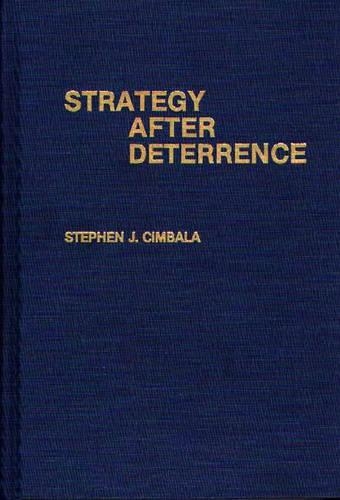
Strategy After Deterrence
(Hardback)
Publishing Details
Strategy After Deterrence
By (Author) Stephen J. Cimbala
Bloomsbury Publishing PLC
Praeger Publishers Inc
30th January 1991
United States
Classifications
Tertiary Education
Non Fiction
355.03354
Physical Properties
Hardback
288
Width 156mm, Height 235mm
624g
Description
The profound political changes in the USSR and Eastern Europe during 1989 have forced the United States and its Western European allies to reevaluate both their long held military strategy of nuclear deterrence and the traditional role of NATO in European affairs. In this volume, Stephen Cimbala considers the ways in which American military priorities will have to change now that the tangible threat to Europe has been removed, exploring the options available to America and NATO given the new political and economic realities in Europe and the Soviet Union. Drawing upon a rich literature of Soviet and American defense strategy, Cimbala examines the structure and effectiveness of deterrence as a military strategy, the relationship between conventional and nuclear weapons, the likely course of future conflicts, and alternative military strategies. Following an introductory chapter which defines the concepts of deterrence and dissuasion and offers an overview of the changing character of European politics, Cimbala reviews the political context for the development of military strategy in Europe. Subsequent chapters consider the relationship between military stability and the likelihood of winning wars in their initial stages, analyze the issue of deterrence during war, discuss the potential for atypical wars in the future, and investigate the linkages between deception and deterrence. A separate chapter addresses the attempt to substitute non-nuclear dissuasion for nuclear deterrence, in the form of anti-nuclear strategic defenses which could defeat nuclear offenses. In the final chapter, Cimbala summarizes his conclusions and makes some additional observations about the implications of our new view of NATO and deterrence. Students of international relations, foreign policy, and military studies will find Cimbala's work enlightening and provocative reading.
Reviews
A thoughtful and important look at the foundation for strategic thinking as the post-Cold War era evolves. Cimbala, a recognized specialist on problems of strategic development, uses prevailing concepts of deterrence as a basis to examine its application to an environment that will be decreasingly nuclear and increasingly uncertain. Drawing on a wide variety of theoretical writings and practical examples, the result is both insightful and provocative. The author establishes that deterrence is only one form of dissuasion that uses force and that is not necessarily the best strategy for all eventualities. This volume will both add to an extensive basic literature on the subject of deterrence (e.g., Patrick Morgan's Deterrence: A Conceptual Analysis, and will contribute to a newly evolving body of work (e.g., David W. Tarr, Nuclear Deterrence and International Security: Alternative Nuclear Regimes, 1991). Extensive notes.-Choice
"A thoughtful and important look at the foundation for strategic thinking as the post-Cold War era evolves. Cimbala, a recognized specialist on problems of strategic development, uses prevailing concepts of deterrence as a basis to examine its application to an environment that will be decreasingly nuclear and increasingly uncertain. Drawing on a wide variety of theoretical writings and practical examples, the result is both insightful and provocative. The author establishes that deterrence is only one form of dissuasion that uses force and that is not necessarily the best strategy for all eventualities. This volume will both add to an extensive basic literature on the subject of deterrence (e.g., Patrick Morgan's Deterrence: A Conceptual Analysis, and will contribute to a newly evolving body of work (e.g., David W. Tarr, Nuclear Deterrence and International Security: Alternative Nuclear Regimes, 1991). Extensive notes."-Choice
Author Bio
STEPHEN J. CIMBALA is Professor of Political Science at Pennsylvania State University, Delaware County. His previous books include Strategic Impasse (Greenwood, 1989), Nuclear Endings (Praeger, 1989), and Uncertainty and Control: Future Soviet and American Strategy.
